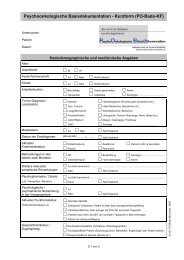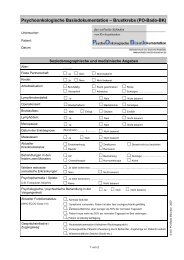PO-Bado Manual (2 - PO-Bado - TUM
PO-Bado Manual (2 - PO-Bado - TUM
PO-Bado Manual (2 - PO-Bado - TUM
You also want an ePaper? Increase the reach of your titles
YUMPU automatically turns print PDFs into web optimized ePapers that Google loves.
<strong>PO</strong>-<strong>Bado</strong> <strong>Manual</strong> (© work group <strong>PO</strong>-<strong>Bado</strong> 2004) 14<br />
Example: A patient with a stoma finds it in some respects difficult to accept changes to<br />
her body after a recent ostomy. She has nevertheless learnt to take care of her stoma<br />
herself and is not hesitant to speak about her feelings with her husband. (Rating: 1)<br />
• Depression / Grief<br />
Does the patient seem depressed and sad? Does he/she express feelings of emotional pain?<br />
Is he/she no longer able to take pleasure in previously enjoyable activities and suffers from<br />
this? Does the patient show resignation or does he/she see the current situation as hopeless?<br />
Does he/she experience an unfamiliar lack of drive? Is he/she withdrawn from others? The<br />
examiner should pay particular attention to non-verbal signs of depressiveness (facial<br />
expression, gesture, vitality, behaviour changes).<br />
Grief / Sadness constitute a frequent response to the manifold cancer-related losses the<br />
patients have to deal with. This involves not only the loss of bodily integrity but also the loss of<br />
future perspectives and the upheaval of fundamental attitudes and values. Does the patient<br />
suffer from a grief reaction? Does he/she feel sad or pained in the face of a permanent loss?<br />
A grief reaction sometimes can only be distinguished from a depressive condition after<br />
considerable time. Painful and pronounced feelings of sadness often constitute evidence<br />
against the presence of depression, as in such cases there is an awareness of the loss.<br />
Example: A patient reports with obvious pain that, after his lung operation, he can no<br />
longer realize many of the plans he had made for his retirement. (Rating: 3)<br />
Signs of a depressive reaction are: loss of pleasure and interest in activities previously<br />
experienced as pleasant, depressive mood, feelings of worthlessness and hopelessness,<br />
experiencing life as pointless, incessant mulling over thoughts the patient does not manage to<br />
escape, feelings of guilt or believing oneself to be an encumbrance to others, the inability to<br />
make decisions, a diminished ability to think and concentrate, feeling overburdened (“I wont<br />
make it”), a lack or loss of drive, sleep disturbances, especially waking up in the early<br />
morning, psychomotor slowdown or inner restlessness, social withdrawal, and suicidal<br />
thoughts.<br />
• Example: A breast cancer patient feels worthless since the removal of her left breast<br />
und has subsequently restricted her social contacts, as she feels that others do not<br />
understand her. She sleeps in until very late in the morning and does not feel like<br />
doing things which she used to like. As she can not pursue her profession, she does<br />
not feel very hopeful about her prospects. She fears that she soon may become<br />
dependant on welfare and sees no way out. (Rating: 3)<br />
• Other psychological problems








